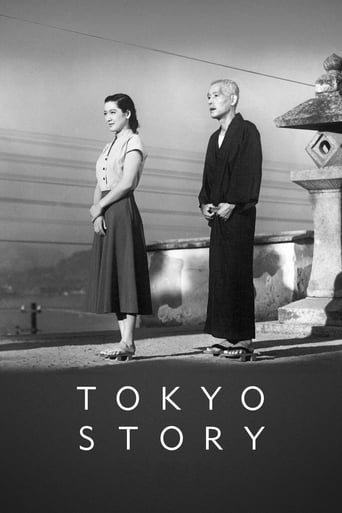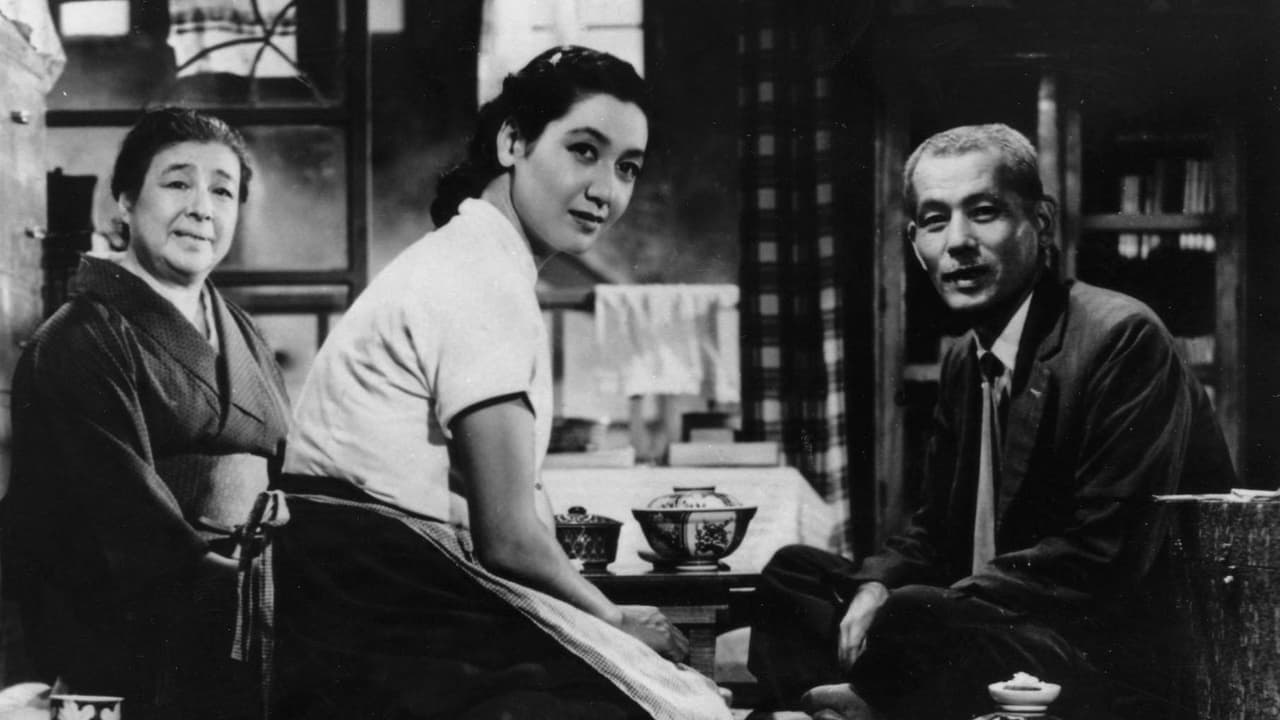Tyson Hunsaker
Tokyo Story won't appeal to movie-goers of all kinds but will definitely attract those who enjoy slow-paced character studies with relatable themes that make us think about ourselves and those we love. This 1953 masterpiece depicts an older couple living in country side Japan visiting their children in Tokyo. As they visit their family they receive colder welcomes than expected with the exception of an exceptional, widowed daughter in law. Yasujiro Ozu manages to paint a rather unsettling portrait of post-war life in Tokyo with a strong disconnect from family and a hopeless feeling of loneliness as the couple drifts in the overwhelming landscape of Tokyo. It's obvious great care was taken into the script by the authentic dialogue and humanistic tone of the scenes. The film beautifully explores themes like younger vs older generation gaps, meaning of life in contrast of war, loneliness, and the roles of children and parents.It's not easy examining a clear cut story structure but the story seems to be the daughter in law's story as she fills the slot of the audience as an observer watching the family treat each other. Yet, enough character payoff happens to allow some catharsis. While the structure is hard to examine, Tokyo Story feels as complete and thorough as any film can be. Anyone looking for a deeper and methodical character piece, Tokyo Story is not only highly recommended, it's an incredible study that gets better as each viewing passes and more time passes to mentally digest the film's depth. While it may not appeal to everyone, it most certainly is study reference material for any would be filmmaker on several narrative levels.
hhg2
I have always considered myself a film buff but I just didn't get Tokyo Story. I've enjoyed silent films and "art" films, but this 2+ hour long examination of an elderly couple visiting the big city of Tokyo to visit many of their children and in-laws was painful to watch. I clicked on the "spoiler alert" box but there is really nothing that can be spoiled: the plot is so "everyday life of ordinary people" that there is no suspense at any point in the movie. The parents are very simple people and speak simply, often only affirming or negating a question by saying "yes," "no," or "is that right?" So there is nothing resembling sterling dialogue. No, it is a character study of relationships among the family that carries on interminably.What was odd to me was how unconcerned their children were about the visit and how little they were willing to sacrifice in time for their parents even as the trip must have been long-prepared. Perhaps the cognitive dissonance of my associating Asian cultures with respecting the elderly (if not their parents!) was surprising to me. Most people would have treated elderly strangers with more consideration. Their indifference was almost painful to watch. It was almost as if the director wanted to make the children as selfish and negligent as possible and exaggerated their flaws.The cinematography was excellent but it, too, seemed odd as if beautiful scenic shots were interspersed among the tight interior shots where the sparse dialogue was taking place. It did break up the monotony of the first-grade level vocabulary and dialogue.Give me the weakest Kurosawa any day over this. And Roger Ebert gave it 4 stars (highest rating) and said it was one of the greatest movies EVER made. I'm giving it 6 stars because I must be missing something obvious.
WILLIAM FLANIGAN
Viewed on DVD. This is a plain (shomin-geki) film ostensibly about plain (and not especially attractive) folks using a plain (impoverished) script with: plain (for the most part) acting; plain (often obscured or obscuring) sets; a plain (and often "wandering-about") film score; and plain (and very simple) camera work. To call this static, soporific, house-bound film a "movie" would be a stretch. Nothing much seems to move, and the attributes that render the motion picture a unique art form are pretty much ignored. A "filmed pseudo stage play" might be a more apt description. That said, the director seems to effectively reflect aspects of the contemporary trauma faced by a country whose long-standing (ancient) traditions are in the midst of serious migration in the aftermath of losing a disastrous war. Issues explored include: the ramifications of children no longer traditionally carrying for their aging parents (or wanting to); dealing with the loss of loved ones in the military service; facing rebellious (rather than obedient) children/grandchildren; living in cramped city apartments with dirty hallway; and the emergence of home-based businesses to just get by financially. The character actors who play the aging grandparents are principal weak spots. The actress playing the grandmother over wears a stoic mask; her face rarely reflects the different emotional lines she delivers. The actor who plays the grandfather is seriously miscast. He usually exhibits a goofy expression; lines reduced to continuously repeating "pause words" (like "aahh") and variations of SO DESU KA ("really?", "is that so?", etc.) don't help matters (due to an impoverished script) . Often characters are seen looking out at things which are never shown to the audience (like in a stage play). The director seems to have a fetish for clothes (including under garments) drying on laundry lines. Some scenes show only laundry drying and many scenes have laundry lines in the foreground or the background (surprisingly, there are no scenes of clothes being washed!). Subtitles and video/audio restorations are fine. Bottom line: Unless you are interested in 20th Century Japanese cultural chaos, best to skip this one. WILLIAM FLANIGAN, PhD.
Tony Escobar (clockworkorange1984)
I thoroughly felt moved by Tokyo Story. Ozu's camera felt like I was looking in to a real life family with real life ordeals. The drama centers on the relationships of parents and adult children in a way that is both touching and still relevant. How does one go about aging gracefully? And how do children respond to aging parents? Certainly the way it is handled here is leaning on the malicious and greedy side. There's a sense of yearning for this alien presence (the parents) to be gone and to not be dealt with. It seems like such a burden and a chore to care for elders. And yet there's the silver lining of a widowed daughter-in-law (daughter-in-law!) to save the trip from complete disaster. The ending of a mother passing lingers with you. Even then there's bickering over trifling possessions that the deceased had owned. I felt angry, but also know people in my life who hold no respect for even the dead. The movie ends with Shukishi meditating. I was left to ponder how he must feel knowing that he will be left all alone and also be treated in the same way. I felt sad and bitter, but know also people such as Noriko exist and could bring lightness into the film.


 AD
AD







